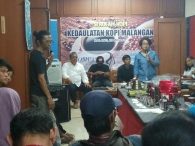INDONESIA – Malang coffee is not inferior to coffee from other regions. People in greater Malang move to strengthen Malang coffee brand at local level. It was considered to be a start for strengthening Malang coffee brand at national level and even up to international level.
That was the red thread of a discussion themed “Upholding Malang Coffee Sovereignty”, held on 20 May 2017, in Kompas Daily Bureau Office in Malang, East Java, Indonesia. The discussion, which started with tasting various coffee from Malang region, was organized by Kompas, Indonesian Peasant Alliance (API) and Coffee Shop Network of Greater Malang. In the event, the efforts to restore the glory of coffee from Malang, expanding the land (extensification) and maintaining the quality of coffee were discussed.
The discussion was attended by API Secretary General Muhammad Nuruddin, Horticulture Germination and Protection Section Chief of Food, Horticulture and Plantation Office of Malang District Budi Widodo, coffee shop owners and coffee farmers in Malang.
Efforts to strengthen the Malang coffee brand were committed by local government, coffee entrepreneurs, farmers and farmer strengthening institutions. Multi-stakeholders collaboration is expected to boost the name of Malang Coffee so it can compete with other varieties such as coffee from Aceh, Banyuwangi, Lampung and Toraja.
Coffee potential in greater Malang is relatively high. There are coffee from the slope of Mount Arjuno, Mt. Panderman, Mt. Kawi, Mt. Semeru and Mt. Bromo. Each coffee variety has its own taste and enthusiasts.

Eko Yudi Sukrianto, coffee farmer from Dampit sub-district, said that he and other hundreds of farmers from three villages in Dampit Subdistrict, Malang District, have organized themselves since two years ago. Those three villages are Srimulyo, Sukodono, and Baturetno. They promote coffee from the three villages as Sridonoretno Coffee.
“Sridonoretno coffee potential is around 500 hectares. But to date, only 7 hectares are well managed. We need holistic education and assistance to keep strengthening Sridonoretno brand as a part of Dampit Coffee,” said Eko Yudi Sukrianto or Sukri.
Sukri added that before 1980s, Dampit coffee had dominated the international coffee market. But since then, Dampit coffee quality deteriorated due to poor management.
“Farmers no longer practice red cherry picking, for example, so quality (of coffee) keep deteriorating,” Sukri explained.
Own the Market
Brand strengthening, according to Wahyu Eko Purwanto, a farmer from Bumi Aji, Batu City, is important because coffee from Malang already have its own market. He added that now is the momentum to reclaim glory as several coffee businessmen from Jakarta now start eyeing Malang coffee.
“Demand from several coffee players for Malang Coffee is starting to increase. But the problem is, sometimes, farmers do not understand coffee (quality) standards required by buyers,” said Wahyu Eko Purwanto.
API Secretary General Muhammad Nuruddin deemed that there are still bad habits among coffee farmers by producing coffee in poor way, for example, harvesting coffee randomly. The cause is there are no incentive provided by businessmen to farmers who fight to maintain quality. Farmers’ efforts to practice red cherry picking were not sufficiently appreciated.
Adopting the model of uniting and organizing themselves, according to Nuruddin, farmers can control each other to keep producing high quality coffee that can be bargained better.
“Here is the role of community, including community of farmer, of coffee shop and also of empowerment institution,” said Nuruddin.
Other than the challenge in improving coffee quality, Malang coffee production also face challenge of decreasing coffee acreage. Budi Widodo, Horticulture Germination and Protection Section Chief of Food, Horticulture and Plantation Office of Malang District, revealed that since 2013 to 2016, robusta coffee acreage in Malang decreased by 2,000 hectares. Now there are only 15,000 hectares of coffee plantation left in Malang. (API)
Related articles:

Comments are closed